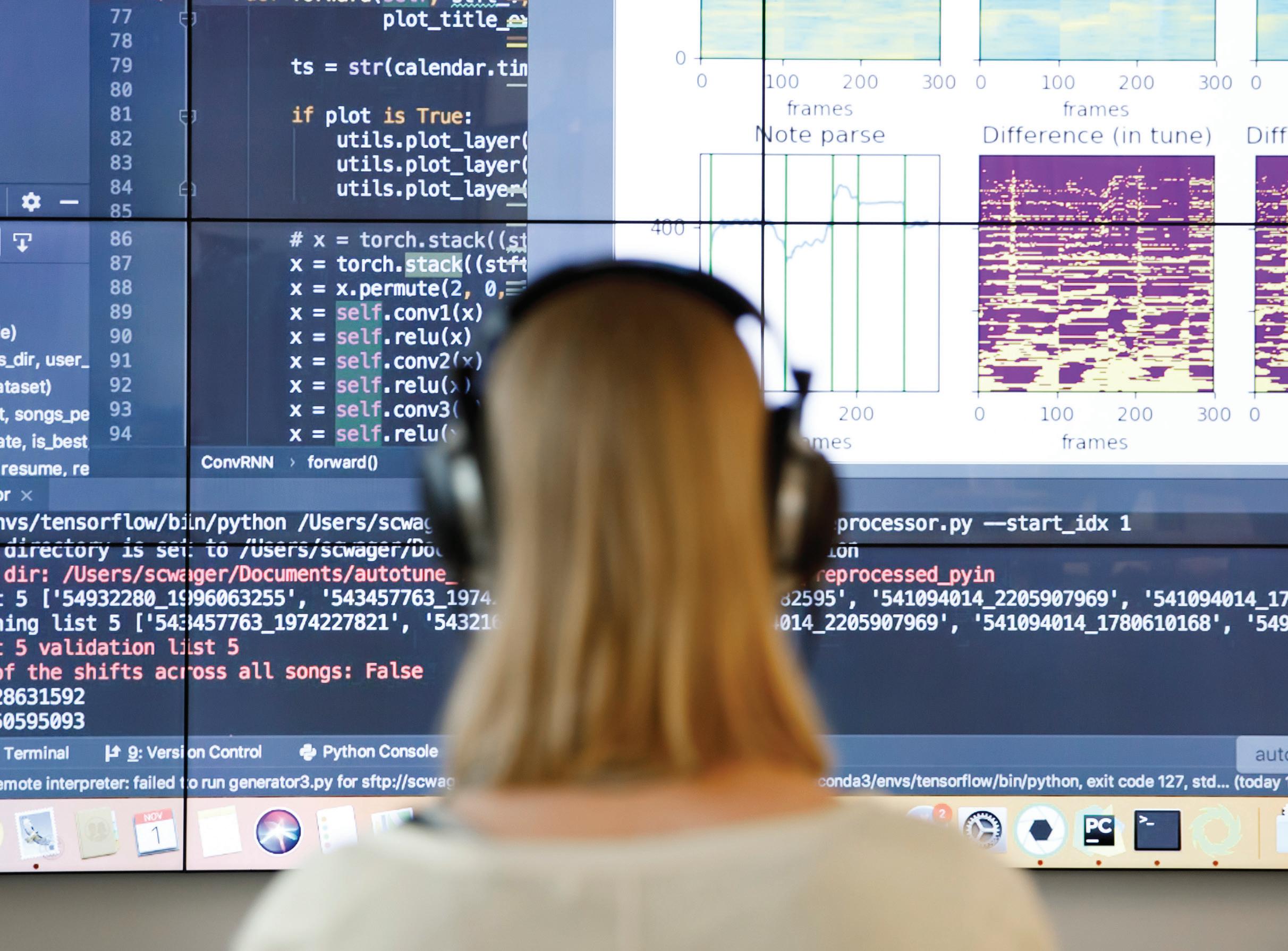UNDERGRADUATE MAJORS







Informatics is an interdisciplinary approach to solving real-world problems using technology, data, and design. It combines technical methods from computer science and engineering with tools and techniques drawn from a breadth of other non-technical areas.
Informatics majors learn the skills necessary to design, implement, and evaluate the next generation of information technology systems.
Our B.S. in Informatics graduates launch careers in a wide range of organizations, including major corporations, consulting firms, and entrepreneurial start-ups. Here’s a look at some stats from the class of 2022:

Top Job Titles (of 254 reported titles)
• 61 CONSULTANT (Business, Cybersecurity, Solutions, Technical/Technology)
• 57 ANALYST (AI, Data, Product, Research, Technical/Technology, Threat)
• 18 ENGINEER (Network, Operations, Project, Software, Solutions)
• 20 DEVELOPER (Business, Intelligence, Sales, Software, Web)
Informatics Career Success
97% success rate (employed or accepted to graduate school)
$75,889 average starting salary
Core Courses
Informatics students take 26 credits of core courses, including:
• INFO I101 Introduction to Informatics
• INFO I201 Mathematical Foundations of Informatics
• INFO I202 Social Informatics
• INFO I210 Information Infrastructure
• INFO I211 Information Infrastructure II
• INFO I300 Human-Computer Interaction
• INFO I308 Information Representation
• INFO Y395 Career Development for Informatics Majors
Cognates
Cognates are an opportunity to customize your degree. Expand your skillset by choosing an option from more than 30* specialty areas, including:
• Animal-Computer Interaction
• Art and Design
• Biology
• Business
• Chemistry
• Cognitive Science
• Computer Science
• Economics
• Geography
• Individualized
• Human-Centered Computing
• Linguistics
*Note that several cognates have multiple options
• Mathematics
• Media
• Medical Sciences
• Music
• Philosophy of Mind and Cognition
• Pre-Health Professions
• Psychology
• Public and Environmental Affairs
• Public Health
• Security
• Virtual Reality
• Web Design and Development
See the IU bulletin for a complete listing of degree requirements.
luddy.indiana.edu
luddyrec@indiana.edu




Artificial intelligence (AI) is driving a revolution in concepts and products in commerce and industry. Our intelligent systems engineering program is designed to focus on the AI-driven engineering that will lead this transformation. Our B.S. in Intelligent Systems Engineering provides technical depth through computing and interdisciplinary learning to help students become well-rounded, forward-thinking engineers who will shape the future of technology and society.
Intelligent systems engineers design and create computational and physical hybrids ranging from intelligent nanostructured materials to swarms of sensors or smart devices. Our design-centered curriculum includes course work and experience in essential technology approaches like big data, computational modeling, and artificial intelligence.

ISE graduates have found careers in the aeronautical, automotive and cybersecurity industries, as well as at tech powerhouses. Others have earned Master’s and Ph.D.’s, or used Luddy’s pre-med track in bioengineering to transition into medical school.
A sampling of places our ISE alumni land:
ISE students take 39 credits of core courses, including:
• ENGR E101 Innovation and Design
• ENGR E110 Engineering Computing Architectures
• ENGR E111 Software Systems Engineering
• ENGR E201 Computer Systems Engineering
• ENGR E221 Intelligent Systems I
• ENGR E225 Introduction to Circuits
• ENGR E250 Systems, Signals, and Control
• ENGR E299 Engineering Professionalization and Ethics
• ENGR E332 Introduction to Modeling and Simulation
• ENGR Y395 Career Development for ISE Majors
• MATH E449 Advanced Undergraduate Engineering Mathematical Methods
Students select one of three concentrations:
Bioengineering
How to address biological, environmental, agricultural, and medical challenges in ways that improve individual human lives and the way humans live in their environment. Also has a pre-med track.
Computer Engineering/ Cyber-physical Systems Engineering
Direct applications of computing. CE includes everything from artificial intelligence to building more efficient networks to making computer hardware smaller, faster, and more capable. CPS combines human or environmental interaction with computational technology to build ‘smart’ networked systems engineered to sense and interact with the physical world.
Molecular and Nanoscale Engineering
Integrates concepts from electrical and materials engineering with nanoscience, designing atomby-atom structures to create real-world devices with previously unachievable behaviors and performance. Nanoengineers apply sensing and nanofabrication technologies to a wide range of arenas, such as energy and food production, and national security.
See the IU bulletin for a complete listing of degree requirements.
luddy.indiana.edu
luddyrec@indiana.edu
Our B.S. in Computer Science gives you the technology skills and know-how to address even the world’s most complex challenges, from your phone to your future self-driving car.
This degree provides you with in-depth, hands-on experience in both the theory and application of computing, including artificial intelligence, machine learning, computer security, computational biology, computer vision, parallel and distributed systems, and more.

Considering an advanced degree? Ask about our Accelerated Master’s in Computer Science program.
Our B.S. in Computer Science graduates launch careers in a wide range of organizations, including major corporations, consulting firms, and entrepreneurial start-ups. Here’s a look at some stats from the class of 2022:
Top Job Titles (of 77 reported titles)
• 37 ENGINEER (Data, ML, Platform, Production, QA, Software, Solutions)
• 19 OTHER (Consultant, Associate, Scientist, Manager)
• 8 DEVELOPER (Digital, Tech, Full-Stack, Python, Software)
• 8 ANALYST (Consulting, Trading, Solutions Engineering)
Computer Science Career Success
93% success rate (employed or accepted to graduate school)
$81,907 average starting salary
Core Courses
Computer Science students take 16 credits of core courses, including:
• CSCI C200 Intro to Computers and Programming or CSCI C211 Intro to Computer Science
• CSCI C212 Intro to Software Systems
• CSCI C241 Discrete Structures for Computer Science
• CSCI C343 Data Structures
• CSCI Y395 Career Development for CS Majors
Specialization
Select from one of the eight options outlined below.
Artificial Intelligence (AI)
Data Science (DS)
Foundations
Game Development
Programming Languages (PL)
Security
Software Engineering (SE)
Systems
Artificial intelligence, machine learning, and data mining—skills that are in-demand in nearly all industries
Algorithms, programming, and systems expertise needed to acquire, model, store, search, analyze, mine, and learn to extract knowledge from data
Fundamentals of computing theory and structure, including algorithm design and analysis, language theory, and more
Design principles, development tools, and the fundamental concepts for creating compelling games of all types
Practical and philosophical aspects of programming
The theory, practice, and tools behind securing computer, network, and software systems
Principles and techniques of software engineering essential for the design and development of software products
Hardware organization of computers and networks, internal operations of the computers
See the IU bulletin for a complete listing of degree requirements.
luddy.indiana.edu
luddyrec@indiana.edu
Data science impacts our everyday lives. From big data to cloud computing, from astronomy to sports, data science is the foundation of our data-driven future, and the demand for trained data scientists has never been higher.

The broad, blended curriculum of our B.S. in Data Science program provides the foundation to build the knowledge and experience necessary to create an in-demand skillset in this rapidly growing field. Data scientists from our program will help provide leadership in creative solutions for 21st century problems.
The first cohort of B.S. in Data Science students will graduate in 2024, but our students are already doing amazing work in internships. Demand is high for data scientists, and salaries are very competitive. These are just some of the reasons data scientist has been called the most promising career by LinkedIn.
• Named in the top 5 “Best Jobs” by Fortune (and has been in the top three spots for the last seven years) and 10 “Best Jobs” by U.S. News in 2022.
• Demand for data scientists has grown by 480% since 2016 according to Glassdoor.
• 22% projected job growth by 2030 according to the Bureau of Labor Statistics.
Core Courses
Data Science students take 25 credits of core courses, including:
• INFO I123 Data Fluency
• STAT S350 Introduction to Statistics
• CSCI A310 Problem Solving Using Data
• DSCI D321 Data Representation and Processing
• STAT S352 Statistical Inference
• DSCI D351 Big Data Analytics
• DSCI D498 and D499 Capstone I and II
Specializations
These 15-18 credit tracks allow you to refine your skills to your area of interest:
Foundational Data Science
The fundamental concepts of data science, from data analysis to the principles of machine learning, database concepts, algorithm design, and statistical theory
Data Systems
Network and Applied Data Science
Data Science Design
Embedded systems, cloud computing, distributed systems, and big data applications are just some of the areas of focus of this specialization
The fundamentals of network science and data visualization, and how to apply this knowledge to a variety of areas such as big data, data mining, analytics, and biology
Making data science more understandable through design, including through visualization and prototyping
Biological and Health Science
How to combine data science with the natural sciences to improve healthcare outcomes and our understanding of our world through digital biology, data analysis, and analytics
See the IU bulletin for a complete listing of degree requirements.
luddy.indiana.edu
luddyrec@indiana.edu
Our B.S. in Cybersecurity and Global Policy is the first undergraduate degree of its kind in the country. A collaborative partnership between the Luddy School of Informatics, Computing, and Engineering; the College of Arts and Sciences; and the Hamilton Lugar School of Global and International Studies, the program provides students with the technical skills, policy expertise, and language and cultural fluency needed to understand and work in one of the most important and rapidly-expanding fields.
Whether you are a novice or have prior technical experience, we’ll teach you the skills you need to be on the frontline of the fight to secure our data, identities, financial transactions, and more. The B.S. in Cybersecurity and Global Policy builds on IU’s investment and strength in cybersecurity, and will allow our graduates to do far more than operate complex software systems.

• $102,600 MEDIAN ANNUAL SALARY*
• 33% JOB GROWTH PREDICTED FROM 2020-2030*
• 1.5 MILLION+ JOB OPENINGS IN CYBERSECURITY
*Bureau of Labor Statistics
CYBERSECURITY AND GLOBAL POLICY CAREER OUTLOOK:Our interdisciplinary approach will give students the tools needed to understand and communicate the challenges posed by cybersecurity and anticipate what public and private sectors will need to do in the coming years to ensure that cybersecurity serves public, private, military, and intelligence needs on a global scale. It will provide the technical, communication, area culture, legal, and policymaking skills to allow our students to work closely with a wide range of experts in every industry sector.

The Bachelor of Science degree requires at least 120 credit hours, while the major requires at least 71.5 credit hours, including the requirements below:
Technical Foundations:
• Introduction to Informatics
• Mathematical Foundations of Informatics
• Information Infrastructure 1
• Information Infrastructure 2
Policy Foundations:
• Introduction to International Studies
• Introduction to International Law and Legal Institutions
• Origins and Evolution of International Law
• International Diplomacy and Security
Cybersecurity Core:
• Analytical Foundations of Security
Global Policy Core:
• Diplomacy, Security, Governance
• Introduction to International Relations
• Ethics and Decision-Making in International Politics
• Cybersecurity, Policy, and Governance
Additional Requirements:
• Area Studies
• Intelligence
• Data Visualization
• Culture in the Digital Age
• Capstone
Mathematical Modeling
• Introduction to the Mathematics of Cybersecurity
• Systems Programming with C and Unix
• Security for Networked Systems
• Systems & Protocol Security & Information Assurance
Addenda Requirement See
luddy.indiana.edu
luddyrec@indiana.edu